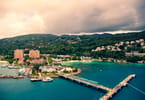CAIRO — A bomb in a landmark Cairo bazaar killed a French tourist and wounded 22 people, most of them holidaymakers, on Sunday in the first deadly violence against Westerners in Egypt since 2006.
The attack struck in early evening in a street lined with cafes and restaurants in Khan al-Khalili, a 1,500-year-old market that is one of the Egyptian capital’s main tourist attractions, witnesses told AFP.
There were conflicting accounts as to how the attack was carried out.
Witnesses and a police official told AFP that two grenades were thrown from a rooftop overlooking the street.
The second device failed to detonate and was blown up by sappers in a controlled explosion, a police source said.
The state MENA news agency cited a security source, however, as saying that the explosives had been left under a bench in a plastic bag packed with nails.
The Frenchman died in hospital from his injuries, Health Minister Hatem al-Gabali told state television.
The wounded consisted of 15 French tourists — three of them with more serious injuries — one German, three Saudis and three Egyptians, a security source said.
The television showed footage of the health minister visiting the casualties in hospital. He said most of them had sustained shrapnel wounds and that one of them had needed surgery.
The French foreign ministry confirmed that one national had been killed. It said that eight more were among the wounded.
Egyptian state television showed bomb disposal teams combing the usually packed neighbourhood for other devices after the attack.
“There was smoke and a woman crying,” a witness told the television.
“We closed our shops. They said that maybe something was thrown from the roof of the hotel.”
The bombs went off outside the Al-Hussein hotel, just across the square from the Hussein mosque, which dates back to 1154 AD and is among the Egyptian capital’s oldest places of worship.
The head of Cairo’s Al-Azhar University — Sunni Islam’s highest religious authority — condemned the bombing in a statement carried by the state MENA news agency.
“Those who carried out this criminal act are traitors to their own religion and their nation, and they are distorting the image of Islam which rejects terrorism and bans the killing of innocents,” Sheikh Mohammed Sayyed al-Tantawi said.
It was the first deadly attack on tourists in the Egyptian capital since a previous bomb attack in the same neighbourhood which killed two tourists and wounded 18 in 2005.
In April 2006, 20 holidaymakers were killed in the Red Sea resort of Dahab, one of a series of bombings in the Sinai peninsula that were blamed on militants loyal to Al-Qaeda.
Egypt was struck by a spate of deadly attacks on Westerners by Islamic militant groups in the 1990s that dealt a savage blow to the country’s vital tourism sector.
Italian tourist Francesca Camera, 29, told AFP she was frightened by the new attack. She only arrived in Cairo on Saturday and made Khan al-Khalili her first place to visit.
“I don’t feel safe any more,” she said. “I was planning to visit the Pyramids tomorrow, but now I think it’s risky. There might be another attack, so I won’t go.”
Souvenir shop owner Taha, 20, slammed the bombers, accusing them of trying to destroy the country and its vital tourism income.
“They killed my livehood, these people. They just want to destroy our country. No Muslim, no Christian can do that,” he said.
Last year, a total of 13 million tourists visited Egypt, earning it 11 billion dollars in revenues, or 11.1 percent of GNP. The industry also employs 12.6 percent of the workforce.
France accounted for 600,000 of last year’s tourists, behind Russia with 1.8 million, Britain and Germany with 1.2 million each, and Italy with 1 million.
Only remittances from foreign workers and receipts from shipping through the Suez Canal rank anywhere near as importantly as sources of revenue for Egypt, the Arab world’s most populous nation.






















